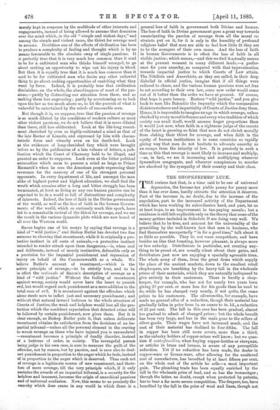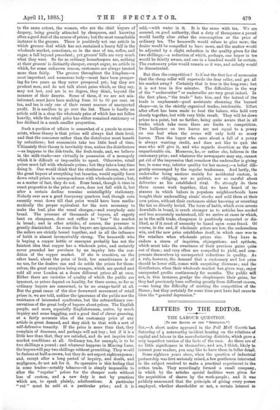THE SHOPKEEPERS' LUCK. THE SHOPKEEPERS' LUCK.
THE curious fact that, in a time said to be one of universal depression, the Income-tax yields penny for penny more than it has ever done, hardly attracts the attention it deserves. Part of the increase is, no doubt, due to the increase of the population, part to the increased activity of the Department which has been working its subordinates hard, and part, let us at least hope, to an improvement in tax-paying morals; but a residuum is still left explicable only on the theory that some of the money-getters included in Schedule D are doing very well. We believe that to be true, and account for the universality of the grumbling by the well-known fact that men in business, who find themselves unexpectedly " in for a good time," talk about it as little as possible. They do not want competitors, and have besides an idea that boasting, however pleasant, is always more or less unlucky. Distributors in particular, not creating anything to be proud of, are usually silent about their gains, and distributors just now are enjoying a specially agreeable time. The whole army of them, from the great firms which supply the place of the ancient markets, down to the smallest retail shopkeepers, are benefiting by the heavy fall in the wholesale prices of their materials, which they are naturally indisposed to give entirely to their customers. There is hardly a shopkeeper, for example, who has not for nearly two years been giving 20 per cent. or more less for his goods than he used to do, while he has charged very nearly, if not quite, the same prices to his customers. The silversmiths, for example, have made no general offer of a reduction, though their material has gradually fallen in price from 5s. an ounce to 4s. ld., a reduction of 22 per cent. The fall in this case has been gradual, almost too gradual to admit of changed prices ; but the whole benefit has been very large, and has in the main gone to the sellers of silver goods. Their wages have not increased much, and the cost of their material has declined to four-fifths. The fall in copper has been .still more severe, more than a third, as the unlucky holders of copper-mines well know ; but we question if materfamilias, when buying copper-kettles or stewpans, or articles in brass and bronze, is aware of any perceptible reduction. Yet if no reduction has been made, the dealer in copper-ware or bronze-ware, after allowing for the unaltered cost of manufacture, has benefited by at least fifteen per cent. on the whole cost of the article he sells—a most important gain. The plumbing trade has been equally enriched by the fall in the wholesale price of lead, and so has the ironmonger ; though the latter, no doubt, except when protected by patents, has to bear a far more severe competition. The drapers, too, have benefited by the fall in the price of wool and linen, though not to the same extent, the women, who are the chief buyers of drapery, being greatly attracted by cheapness, and knowing often a good deal of the course of prices ; but the most remarkable instance is the grocers. There is positively not one article in which grocers deal which has not sustained a heavy fall in the wholesale market, sometimes, as in the case of tea, coffee, and sugar, a fall beyond precedent ; yet grocers' bills are very much what they were. So far as, ordinary housekeepers see, nothing at their grocers' is distinctly cheaper, except sugar, an article in which, for some unknown reason, customers are always treated more than fairly. The grocers throughout the kingdom—a most important and numerous body—must have been prosper. ing for two years as they never prospered yet; but they are prudent men, and do not talk about gains which, as they say, may not last, and are in no degree, they think, beyond the measure of their deserts. Some of them, if we are not misinformed, must have been making from 50 to 60 per cent. on tea, and tea is only one of their recent sources of unexpected profit. It is needless to go over the list. There is hardly an article sold in a shop the wholesale price of which has not fallen heavily, while the retail price has either remained stationary or has declined in a much smaller proportion.
Such a position of affairs is somewhat of a puzzle to economists, whose theory is that prices will always find their level, and that the consumer rather than the distributor must benefit by reductions ; but economists take too little heed of time. Ultimately their theory is inevitably true, unless the distributors —as happens in the fish-trade, the fruit-trade, and, we believe, in the milk-trade—are virtually in possession of a monopoly which it is difficult or impossible to upset. Otherwise, retail prices must fall with wholesale prices ; but they take a long time doing it. One would think that the straitened classes, who are the great buyers of everything but luxuries, would rapidly force down retail prices in correspondence with wholesale prices ; but, as a matter of fact, they do not. Even bread, though it rises in exact proportion to the price of corn, does not fall with it, but after a certain decline remains unintelligibly stationary. Nobody ever saw a good fourpenny quartern loaf, though corn recently went down till that price would have been mathematically the proper equivalent for the corn necessary to make the loaf, plus the usual charges,—and everybody eats bread. The pressure of thousands of buyers, all eagerly bent on cheapness, does not suffice to " bear " the market in bread ; and in other articles, of course, the pressure is greatly diminished. In some the buyers are ignorant, in others the sellers are strictly bound together, and in all the influence of habit is almost inconceivably strong. The housewife who is baying a copper kettle or saucepan probably has not the faintest idea that copper has a wholesale price, and certainly never preceded her purchase by an inquiry into the condition of the copper market. If she is sensitive, on the other hand, about the price of fruit, her sensitiveness is of no use, for the dealers can and do settle the prices for themselves, the great exception being oranges, which are quoted and sold all over London at a dozen different prices all at once. Either there are varieties of quality of which the public are ignorant, or prices depend on locality, for there seems, so far as ordinary buyers are concerned, to be no orange-tariff at all. But the great cause of the slow downward movement of retail prices is, we are told, neither the ignorance of the public nor the resistance of interested syndicates, but the extraordinary conservatism of the great body of buyers about prices. The English people, and more especially Englishwomen, arrive, by much inquiry and some haggling, and a good deal of clever guessing, at a fairly accurate idea of the customary price of any article in great demand, and they stick to that with a sort of sell-defensive tenacity. U the price is more than that, they complain of dearness, and perhaps will not buy ; but if it is a little less than that, they are satisfied, and do not inquire into market conditions at all. Ordinary tea, for example, is to be two shillings a pound ; and whatever happens in Mincing Lane, the buyers will pay two shillings without grumbling. They would be furious at half-a-crown, but they do not expect eighteenpence ; and, except after a long period of inquiry, and doubt, and negligence, do not ask for it. So operative is this feeling that in some trades—notably tobacco—it is simply impossible to alter the "regular" prices for the cheaper sorts without loss of custom, and a new duty is met by practices which are, to speak plainly, adulterations. A particular " cut " must be sold at a particular price ; and it is sold,—with water in it. It is the same with tea. We are assured, on good authority, that a duty of threepence a pound would hardly alter either the consumption or the price of ordinary tea. The housewife would refuse to give more, the dealer would be compelled to have more, and the matter would be adjusted by a slight reduction in the quality given for the two shillings,—a reduction of which, perhaps, one buyer in ten would be faintly aware, and one in a, hundred would be certainThe customary price would remain as it was, and nobody would be discontented.
But then the competition ? Is ienot the first law of economics that the cheap seller will supersede the dear seller, and get all his market away P Certainly that is true in the long-run; but it is not true in five minutes. The difficulties in the way of the " undercutter " or underseller are very great indeed. In the first place, "the trade" hate him, and the hatred of the trade is unpleasant—good assistants shunning the banned shops—or, in the strictly organised trades, intolerable. Effort after effort has been made to beat the bakers, who hold very closely together, but with very little result. They will let-down prices to a point, but no farther, being quite aware that in alt trades which take room there are limits to competition. Two halfpence on two loaves are not equal to a penny on one loaf when the ovens will only bold so many loaves. Then the buyer who cares about a fall of a penny is always wanting credit, and does not like to quit the man who will give it, and who regards desertion• as the one unpardonable sin. Moreover, he, or rather she, believes in the customary price ; and whatever the newspapers may say, cannot get rid of the impression that somehow the underseller is giving her, in some way, inferior quality for her money, —a belief diligently encouraged by the regular tradesman. And lastly, the underseller being anxious mainly for accidental custom, is neither so obliging, nor so patient, nor so careful about deliveries as his established rival. So strongly do these three causes work together, that we have heard of instances in which bakers in populous neighbourhoods have bought their underselling rivals' stocks and sold them at their own prices, without their customers either knowing or resenting the tax so directly levied. The force of habit, which even arrests downfalls in bread, is much stronger as to articles less needed and less accurately understood, till we arrive at cases kr which, as in the milk trade, cheapness is positively suspected or disliked, as if it must of necessity be based upon some fraud. Of course, in the end, if wholesale prices are low, the undersellers win, and the new price establishes itself, in which case woe to the retailers when wholesale prices rise. They have bo endure a storm of inquiries, objurgations, and epithets, which must take the sweetness of their previous gains quite out of them ; and very often are compelled to yield, and compensate themselves by unsuspected reductions in quality. As a rule, however, the demand that a customary and low price should be lower still, comes with surprising slowness ; and the distributors, when their wholesale market has given way, enjoy unexpected profits continuously for months. The public will not, in this instance, grudge the shopkeepers their gains, for they had previously been suffering greatly from different causes, —one being the difficulty of meeting the competition of the Stores ; but they certainly for some time past have had cause to bless the "general depression."



































 Previous page
Previous page